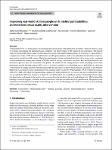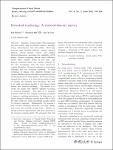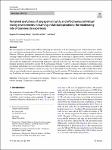Search
Author
- Ancret, Szpak (1)
- Eugene Yin-cheung, Wong (1)
- Hao, Kong (1)
- Lili, Wang (1)
- next >
Subject
- intuitive pedagogical ... (1)
- Virtual reality (1)
- VR scenes (1)
Date issued
- 2023 (3)
Has File(s)
- true (3)
Search Results
Virtual reality (VR) is a promising tool for training life skills in people with intellectual disabilities. However, there is a lack of evidence surrounding the implementation, suitability, and effectiveness of VR training in this population. The present study investigated the effectiveness of VR training for people with intellectual disabilities by assessing (1) their ability to complete basic tasks in VR, (2) real-world transfer and skill generalisation, and (3) the individual characteristics of participants able to benefit from VR training. Thirty-two participants with an intellectual disability of varying severity completed a waste management training intervention in VR that involved sorting 18 items into three bins. |
Recently, virtual reality (VR) technology has been widely used in medical, military, manufacturing, entertainment, and other fields. These applications must simulate different complex material surfaces, various dynamic objects, and complex physical phenomena, increasing the complexity of VR scenes. Current computing devices cannot efficiently render these complex scenes in real time, and delayed rendering makes the content observed by the user inconsistent with the user’s interaction, causing discomfort. Foveated rendering is a promising technique that can accelerate rendering. |
The development of virtual reality (VR) in enhancing the effectiveness of the learning process, with its interactive, immersive, and intuitive pedagogical environment, has become a necessity for corporations with increasingly complex operations. However, VR users’ perceptions, openness and learning effectiveness are seldom comprehensively evaluated, particularly in learning complex industrial operations. In this study, grounded in the technology acceptance model, a moderated mediation model of perceived usefulness, ease of use, openness to experience, and engagement in VR-based learning was developed. The model was empirically validated using responses collected from 321 users who were trained on aircraft and cargo terminal operations powered by a novel VR-based learning platform. |



